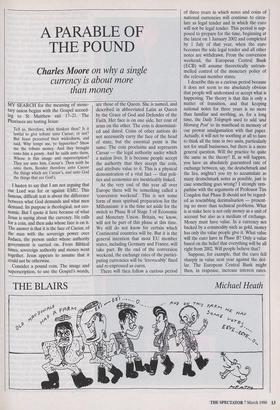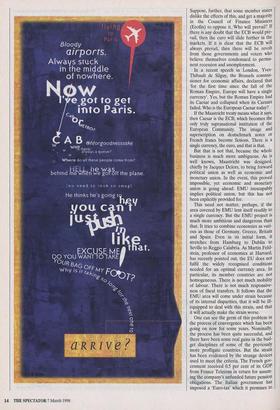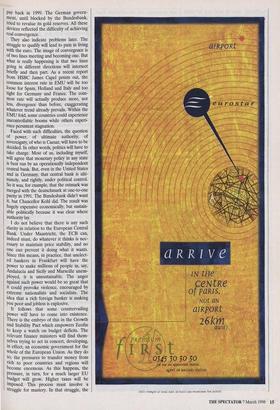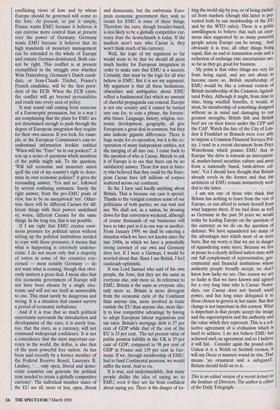A PARABLE OF THE POUND
Charles Moore on why a single
currency is about more than money
MY SEARCH for the meaning of mone- tary union begins with the Gospel accord- ing to St Matthew xxii 17-21. The Pharisees are testing Jesus: Tell us, therefore, what thinkest thou? Is it lawful to give tribute unto Caesar, or not? But Jesus perceived their wickedness, and said, Why tempt me, ye hypocrites? Show me the tribute money. And they brought unto him a penny. And he saith unto them, Whose is this image and superscription? They say unto him, Caesar's. Then saith he unto them, Render therefore unto Caesar the things which are Caesar's, and unto God the things that are God's.
I hasten to say that I am not arguing that our Lord was for or against EMU. This famous, difficult text is about the difference between what God demands and what men demand. Its purpose is theological, not eco- nomic. But I quote it here because of what Jesus is saying about the currency. He calls for a coin, and then asks whose face is on it. The answer is that it is the face of Caesar, of the man with the sovereign power over Judaea, the person under whose authority government is carried on. From Biblical times, sovereign authority and money went together. Jesus appears to assume that it could not be otherwise.
Consider a pound coin. The image and superscription, to use the Gospel's words, are those of the Queen. She is named, and described in abbreviated Latin as Queen by the Grace of God and Defender of the Faith. Her face is on one side, her coat of arms on the other. The coin is denominat- ed and dated. Coins of other nations do not necessarily carry the face of the head of state, but the essential point is the same. The coin proclaims and represents Caesar — the legal authority under which a nation lives. It is because people accept the authority that they accept the coin, and attribute value to it. This is a physical demonstration of a vital fact — that poli- tics and economics are inextricably linked.
At the very end of this year all over Europe there will be something called a `conversion weekend'. This is not some form of mass spiritual preparation for the Millennium: it is the time set aside for the switch to Phase B of Stage 3 of Economic and Monetary Union. Britain, we know, will not be part of this phase at this time. We still do not know for certain which Continental countries will be. But it is the general intention that most EU member states, including Germany and France, will take part. By the end of the conversion weekend, the exchange rates of the partici- pating currencies will be 'irrevocably' fixed and re-expressed as euros.
There will then follow a curious period of three years in which notes and coins of national currencies will continue to circu- late as legal tender and in which the- euro will not be legal tender. This period is sup- posed to prepare for the time, beginning at the latest on 1 January 2002 and completed by 1 July of that year, when the euro becomes the sole legal tender and all other notes are withdrawn. From the conversion weekend, the European Central Bank (ECB) will assume theoretically untram- melled control of the monetary policy of the relevant member states.
I describe this as a curious period because it does not seem to me absolutely obvious that people will understand or accept what is happening. The theory is that this is only a matter of transition, and that keeping national notes for three years is no more than familiar and soothing, as, for a long time, the Daily Telegraph used to add 'and Morning Post' to its masthead in memory of our prewar amalgamation with that paper. Actually, it will not be soothing at all to have to think all the time in two units, particularly not for small businesses, but there is a more general question. Will the practice be quite the same as the theory? If, as will happen, you have an absolutely guaranteed rate of exchange between, say, the deutschmark and the lira, mightn't you try to accumulate as many deutschmark notes as possible, just in case something goes wrong? I strongly sym- pathise with the arguments of Professor Tim Congdon that Phase B should not be regard- ed as resembling decimalisation — present- ing no more than technical problems. What is at stake here is not only money as a unit of account but also as a medium of exchange. Money must have value. In a currency not backed by a commodity such as gold, money has only the value people give it. What value will the euro have in Phase B? Only a value based on the belief that everything will be all right from 2002. Will people believe that?
Suppose, for example, that the euro fell sharply in value next year against the dol- lar. The European Central Bank might then, in response, increase interest rates. Suppose, further, that some member states dislike the effects of this, and get a majority in the Council of Finance Ministers (Ecofin) to oppose it. Who will prevail? If there is any doubt that the ECB would pre- vail, then the euro will slide further in the markets. If it is clear that the ECB will always prevail, then there will be revolt from those governments and voters who believe themselves condemned to perma- nent recession and unemployment.
In a recent speech in London, Yves- Thibault de Silguy, the Brussels commis- sioner for economic affairs, declared that `for the first time since the fall of the Roman Empire, Europe will have a single currency'. Yes, but the Roman Empire had its Caesar and collapsed when its Caesars failed. Who is the European Caesar today?
If the Maastricht treaty means what it says, then Caesar is the ECB, which becomes the only truly supranational institution of the European Community. The image and superscription on deutschmark notes or French francs become fictions. There is a single currency, the euro, and that is that.
But that is not that, because the whole business is much more ambiguous. As is well known, Maastricht was designed, chiefly by Jacques Delors, to bring forward political union as well as economic and monetary union. In the event, this proved impossible, yet economic and monetary union is going ahead. EMU inescapably implies political union, but this has not been explicitly provided for.
This need not matter, perhaps, if the area covered by EMU lent itself readily to a single currency. But the EMU project is much more ambitious and dangerous than that. It tries to combine economies as vari- ous as those of Germany, Greece, Britain and Spain. Even in its initial form, it stretches from Hamburg to Dublin to Seville to Reggio Calabria. As Martin Feld- stein, professor of economics at Harvard, has recently pointed out, the EU does not fulfil the widely recognised conditions needed for an optimal currency area. In particular, its member countries are not homogeneous. There is not much mobility of labour. There is not much responsive- ness of fiscal transfers. It follows that the EMU area will come under strain because of its internal disparities, that it will be ill- equipped to deal with this strain, and that it will actually make the strain worse.
One can see the germ of this problem in the process of convergence which has been going on now for some years. Nominally, the process has been quite successful, and there have been some real gains in the bud- get disciplines of some of the previously more profligate countries. But the strain has been evidenced by the strange devices used to meet the criteria. The French gov- ernment received 0.5 per cent of its GDP from France Telecom in return for assum- ing the company's unfunded future pension obligations. The Italian government has imposed a 'Euro-tax' which it promises to pay back in 1999. The German govern- ment, until blocked by the Bundesbank, tried to revalue its gold reserves. All these devices reflected the difficulty of achieving real convergence.
They also indicate problems later. The struggle to qualify will lead to pain in living with the euro. The image of convergence is of two lines meeting and becoming one. But what is really happening is that two lines going in different directions will intersect briefly and then part. As a recent report from HSBC James Capel points out, the common interest rate in EMU will be too loose for Spain, Holland and Italy and too tight for Germany and France. The com- mon rate will actually produce more, not less, divergence than before, exaggerating Whatever trend already prevails. Within the EMU fold, some countries could experience Uncontrollable booms while others experi- ence persistent stagnation.
Faced with such difficulties, the question of power, of ultimate authority, of sovereignty, of who is Caesar, will have to be decided. In other words, politics will have to take charge. Most of us, including myself, will agree that monetary policy in any state is best run by an operationally independent central bank. But, even in the United States and in Germany, that central bank is ulti- mately, and rightly, under political control. So it was, for example, that the ostmark was merged with the deutschmark at one-to-one Parity in 1991. The Bundesbank didn't want it, but Chancellor Kohl did. The result was hugely expensive economically, but sustain- able politically because it was clear where authority lay.
I do not believe that there is any such clarity in relation to the European Central Bank. Under Maastricht, the ECB can, indeed must, do whatever it thinks is nec- essary to maintain price stability, and no one can prevent it doing what it wants. Since this means, in practice, that unelect- ed bankers in Frankfurt will have the power to make millions of people in, say, Andalucia and Sicily and Marseille unem- ployed, it is unsustainable. The anger against such power would be so great that it could provoke violence, encouraged by extreme nationalists and socialists. The idea that a rich foreign banker is making you poor and jobless is explosive.
It follows that some countervailing Power will have to come into existence. There is the embryo of this in the Growth and Stability Pact which empowers Ecofin to keep a watch on budget deficits. The relevant finance ministers will find them- selves trying to act in concert, developing, in effect, an economic government for the Whole of the European Union. As they do so, the pressures to transfer money from rich to poor countries and regions will become enormous. As this happens, the Pressure, in turn, for a much larger EU budget will grow. Higher taxes will be imposed. This process must involve a struggle for mastery. In that struggle, the conflicting views of how and by whom Europe should be governed will come to the fore. At present, to put it simply, France wants EMU because it believes it can exercise more control than at present over the power of Germany. Germany wants EMU because it believes that its high standards of monetary management can be extended to the whole of Europe and remain German-dominated. Both can- not be right. This conflict is at present exemplified in the struggle over whether Winn Duisenberg, Germany's Dutch candi- date, or Jean-Claude Trichet, France's French candidate, will be the first presi- dent of the ECB. When the ECB exists, the conflict will go beyond personalities and reach into every area of policy.
It may sound odd coming from someone of a Eurosceptic persuasion, but in a way I am complaining that the plans for EMU are not determined enough to push through the degree of European integration they require for their own success. If you look, for exam- ple, at the European Commission's easy-to- understand information booklet entitled `When will the "Euro" be in our pockets?', it sets up a series of questions which members of the public might ask. To the question, `Will full economic and monetary union spell the end of my country's right to deter- mine its own economic policies?' it gives the resounding answer, 'Yes and no', followed by several confusing sentences. Surely the right answer, from the pro-EMU point of view, has to be an unequivocal 'yes'. Other- wise there will be different Caesars for dif- ferent things with their powers undefined or, worse, different Caesars for the same things. In the long run, that is not possible.
If I am right that EMU creates enor- mous pressure for political union without setting up the political institutions needed to cope with those pressures, it means that what is happening is extremely undemo- cratic. I do not mean only that a majority of voters in some of the countries con- cerned — most notably Germany — do not want what is coming, though that obvi- ously matters a great deal. I mean also that this economic government of Europe will not have been chosen by a single elec- torate and will not see itself as answerable to one. This must surely be dangerous and wrong. It is a situation that cannot survive a period of economic turbulence.
And if it is true that so much political uncertainty surrounds the introduction and development of the euro, it is surely true, too, that the euro, as a currency, will not command widespread confidence. It is not a coincidence that the most important cur- rency in the world, the dollar, is also that of the most powerful free nation. As has been said recently by a former member of the Federal Reserve Board, Laurence B. Lindsey, `. . . only open, liberal and demo- cratic countries can generate the political trust needed to create a globally competitive currency'. The individual member states of the EU are all, more or less, open, liberal and democratic, but the embryonic Euro- pean economic government they wish to create for EMU is none of these things. Therefore the euro, though broader-based, is less likely to be a globally competitive cur- rency than the deutschmark is today. If the markets aren't sure who Caesar is, they won't think much of his currency.
Well, the logic of my argument so far would seem to be that we should all press much harder for European integration in order to make sure that EMU is a success. Certainly, that must be the logic for all who believe in EMU. But it is not my argument. My argument is that all these hesitations, obscurities and ambiguities about EMU reflect a fundamental fact which no amount of cheerful propaganda can conceal. Europe is not one country and it cannot be turned into one for, to coin a phrase, the foresee- able future. Language, history, religion, eco- nomic development, geography, all give Europeans a great deal in common, but they also indicate gigantic differences. There is huge scope for co-operation, but it is the co- operation of many independent entities, not the merging of all into one. I come back to the question of who is Caesar. Merely to ask it of Europe is to see that there can be no satisfactory answer. Those few men in histo- ry who believed that they could be the Euro- pean Caesar have left millions of corpses scattered across our continent.
So far, I have said hardly anything about Britain. That is because our case is special. Thanks to the vestigial common sense of our politicians of both parties, we can wait and see. We shall not, as a nation, be dressing down for that conversion weekend, although of course thousands of our businesses will have to take part in it in one way or another. From January 1999, we shall be entering a situation which we have not known since the late 1940s, in which we have a potentially strong currency of our own and Germany does not. If I were a German, I would be worried about that. Since I am British, I feel cautiously optimistic.
It was Lord Samuel who said of his own people, the Jews, that they are the same as everyone else, only more so. In reference to EMU, Britain is the same as everyone else, only more so. Britain is more divergent from the economic cycle of the Continent than anyone else, more involved in trade outside the EU than anyone else, more like- ly to lose competitive advantage by having to adopt European labour regulations and tax rates. Britain's mortgage debt is 57 per cent of GDP while that of the rest of the EU is 33 per cent. The net present value of public pension liability in the UK is 19 per cent of GDP, compared to 98 per cent of GDP in France and 139 per cent in Ger- many. If we, through membership of EMU, had to fund Continental pensions, we would suffer the most. And so on.
It is true, and understandable, that many people dislike the idea of saying no to EMU, even if they are far from confident about saying yes. There is the danger of let- ting the world slip by you, or of being exclud- ed from markets (though this latter is pre- vented both by our membership of the EU and by the WTO rules). There is a polite unwillingness to believe that such an enor- mous idea supported by so many powerful people across Europe can be wrong. And obviously it is true, all other things being equal, that an end to transaction costs and a reduction of exchange rate uncertainties are, so far as they go, good for business.
My point is that other things are very far from being equal, and are not about to become more so. British membership of EMU would be like a colossal version of British membership of the Common Agricul- tural Policy. Although it might, from time to time, bring windfall benefits, it would, at most, be membership of something designed without us in mind and damaging to our greatest strengths. British fish and British beef are on their knees under the CFP and the CAP. Watch the fate of the City of Lon- don if Frankfurt or Brussels were ever able to impose a Common Financial Services Pol- icy. I read in a recent document from Price Waterhouse which praises EMU that in Europe 'the drive is towards an internation- al, market-based securities culture and away from a nationally based, bank-driven cul- ture'. Yet I should have thought that Britain already revels in the former and that the architects of EMU remain instinctively wed- ded to the latter.
I am not one of those who think that Britain has nothing to learn from the rest of Europe, or can afford to isolate herself from what happens there. If we had done as well as Germany in the past 50 years we would today be leading Europe on the question of the currency as we do on the question of defence. We have squandered too many of the advantages into which most of us were born. But my worry is that we are in danger of squandering some more. Because we live at peace in a clearly defined nation state with our full complement of representative, gov- ernmental and financial institutions whose authority people broadly accept, we don't know how lucky we are. One reason we are so lucky is that we have known and agreed for a very long time who is Caesar. Nowa- days, our Caesar does not herself wield power, and has long since delegated it to those chosen to govern in her name. But that change is not important in this context. What is important is that people accept the image and the superscription and the authority and the value which they represent. This is a col- lective agreement of a civilisation which is hard to achieve. I do not believe EMU has achieved such an agreement and so I believe it will fail. Consider again the pound coin. Unless it is a Welsh or Scottish version, it will say Decus et tutamen round its rim. That means 'an ornament and a safeguard'. Britain should hold on to it.
This is an edited version of a recent lecture to the Institute of Directors. The author is editor of the Daily Telegraph.





























































 Previous page
Previous page